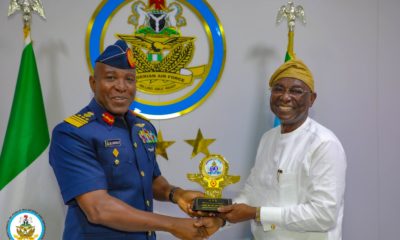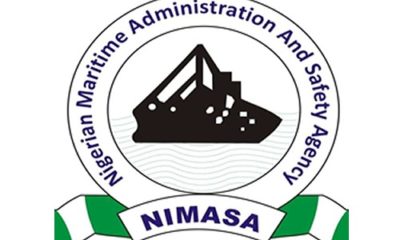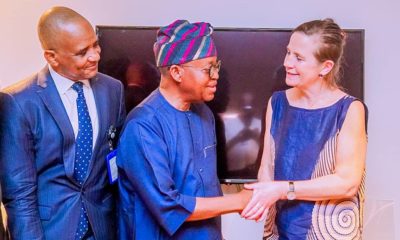Maritime
Global Uncertainty: Embrace Blue Economy, NESG DG Charges Leaders
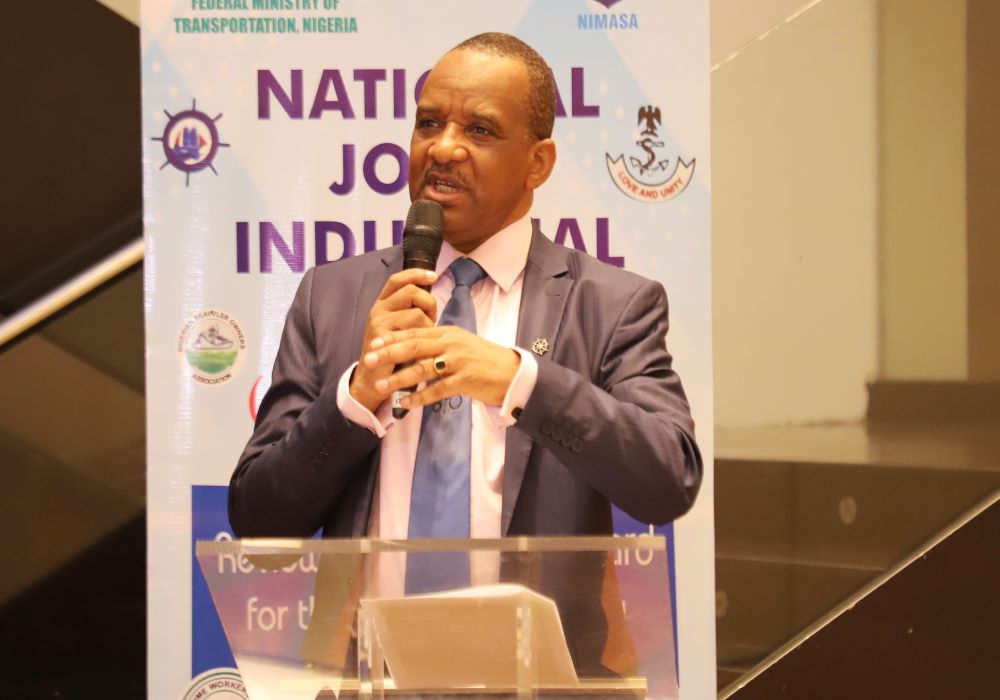
..As NIMASA Organizes Senior Mgt Strategy Session
In the face of global uncertainty due largely to the Ukraine-Russian war and COVID-19 pandemic, the Director General of the Nigerian Economic Summit Group, NESG, ’Laoye Jaiyeola, has urged leaders to embrace the use of technology in the maritime sector and acquire new skills in-demand.
Jaiyeola, who spoke at a three-day Management Strategic session organised by the Nigerian Maritime Administration and Safety Agency, NIMASA, stressed the need to providing leadership in uncertain times.
He noted that the maritime industry is capable of playing a leading role in reshaping the Nigerian economy, and enjoined the Agency to move with the trend to meet up with modern realities while ensuring that the Nigerian maritime sector is in tandem with its counterpart in other climes.
Read also>>>Blue Economy: NIMASA DG, Jamoh Addresses Business Gathering In South Korea
“With the global uncertainty due largely to the Ukraine-Russian war and adapting to the new normal brought unto humanity by COVID-19 which has led to weakening global stability, Blue Economy is the future. Leaders should embrace the use of technology in the maritime sector and acquire new skills in-demand. This is the only way Nigeria can provide leadership in the maritime sector”, he said.
The Senior Management Strategic session 2022, was part of NIMASA’s efforts to review performance and strategize to achieve its mandate.
The event has an eight-year plan made up of short, medium and long-term clearly stated goals aimed at enhancing the performance of the Agency.
Earlier in his speech, NIMASA’s Director General, Dr. Bashir Jamoh, noted that continuous internal stakeholders’ engagement is a key component of the current administration to achieve a successful implementation of her tripod mandate of ensuring Maritime Safety, Maritime Security and Shipping Development for the Nigerian Maritime industry.
Dr. Jamoh disclosed that in order to achieve the mandate of the Agency, it requires collective efforts from all stakeholders, which will in turn help drive investors’ confidence in engaging in businesses in the Nigerian maritime sector.
“Shipping is crucial to the survival of the global economy, as was exemplified during the COVID-19 pandemic, where virtually all sectors of the global economy were grounded, except the shipping industry. For us at NIMASA, we are focused on driving the Agenda of the Federal Government in making the Nigerian maritime sector attractive for investors, while we keep building the capacity of our people to make them compete favourably with their counterparts in the comity of maritime nations”.
Maritime
Shettima Urges Stronger Synergy Among MDAs For Nigeria’s Business Environment

The Vice President of the Federal Republic of Nigeria, Senator Kashim Shettima, has called on Ministries, Departments, and Agencies (MDAs) of government, as well as members of the Presidential Enabling Business Environment Council (PEBEC), to deepen collaboration so as to foster a more conducive environment for doing business.
He made the assertion in Abuja, at the closing session of the PEBEC Retreat for heads of MDAs and MDA Reform Champions.
According to Sen Shettima the overarching goal is to ensure Nigeria remains a preferred destination for investors.
ALSO READ: SNEPCo, Former MD Aiboni Win Energy Times’ Awards
He stated, “This retreat was convened by the Presidential Enabling Business Environment Council (PEBEC), an institution I am privileged to chair, not just to review reform progress, but to deepen something even more critical: synergy.
The business of government is too complex to be solved in silos. We cannot afford the luxury of working in isolation, while the problems we are tasked to solve are increasingly intertwined.”
Among the attendees was the Director General of the Nigerian Maritime Administration and Safety Agency (NIMASA), Dayo Mobereola, who commended PEBEC for organizing the retreat.
He noted that it provided a valuable platform for peer review and constructive engagement among Federal Government appointees, aimed at improving institutional performance and reform delivery.
Maritime
NIMASA Dangles Opportunities Before Private Investors At Enugu Int’l Trade Fair
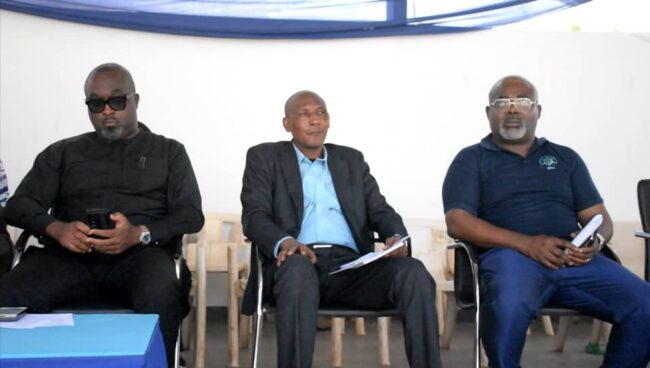
The Nigerian Maritime Administration and Safety Agency (NIMASA) has urged the private sector to seize emerging opportunities in Nigeria’s Blue Economy, particularly in the maritime sector.
The Director General of NIMASA, Dr. Dayo Mobereola made the call at the ongoing 36th Enugu International Trade Fair.
The NIMASA DG who was represented by the Deputy Director in the Planning Research and Data Management Service Department of NIMASA, Umar Mohammed highlighted NIMASA’s commitment to implementing the Renewed Hope Agenda of the Federal Government, while also emphasizing the need for inclusive economic growth through indigenous participation in domestic and international shipping.
ALSO READ: Shell Commends Oloibiri Lecture Series As Platform For Change
“To unlock the full potential of our maritime economy, NIMASA is pursuing an integrated development strategy that will support indigenous operators in ship acquisition, establish a National Carrier Line, and create maritime training institutions for world-class seafarers,” he stated.
He noted that the Agency is also implementing a Public Sector Cargo Support Programme aimed at creating a captive freight market for local carriers and reducing the dominance of foreign shipping lines in Nigeria’s seaborne trade.
Accordingly, he said the Agency’s strategic initiatives are being driven through public-private partnerships to ensure sustainability and long-term impact.
“Therefore, we are inviting investors and entrepreneurs to collaborate with us in developing a robust and competitive maritime sector that will create jobs and boost the national economy,” he added.
The NIMASA DG through his representative used the opportunity to express appreciation to the Governor of Enugu State, Dr. Peter Ndubuisi Mbah, and the leadership of the Enugu Chamber of Commerce, Industry, Mines and Agriculture (ECCIMA) for hosting the trade fair, which he described as a vital platform for business networking and investment drive.
The NIMASA plays a key role in promoting the Blue Economy in Nigeria with its promotional responsibilities, being part of its mandate to regulate maritime activities and ensure sustainable use of ocean resources.
Maritime
Nigeria Moves For Joint Maritime Task Force For Gulf Of Guinea
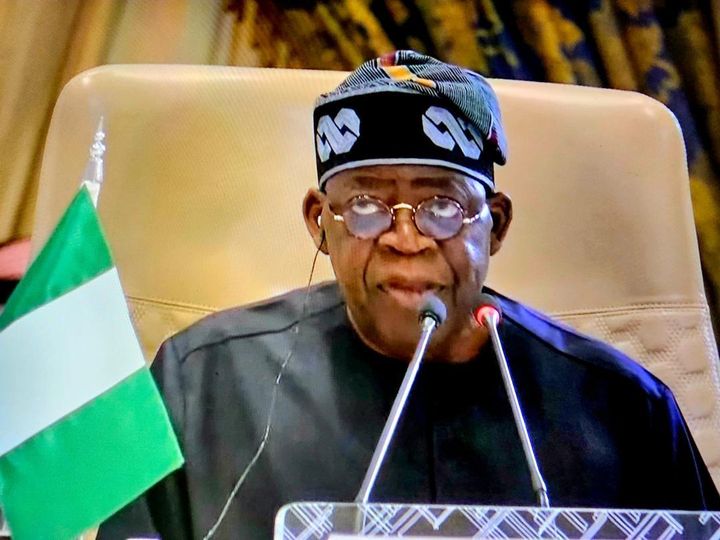
Nigeria’s President, Bola Ahmed Tinubu has tabled a motion for the establishment of a combined maritime task force to enhance security in the Gulf of Guinea before the Africa Union Peace and Security Council (AUPSC).
He made the call at the 38th Ordinary Session of the Assembly of the African Union (AU) Heads of State and Government in Addis Ababa, Ethiopia, on Sunday.
To give effect to the motion, President Tinubu expressed Nigeria’s readiness to host the task force’s headquarters in Lagos.
ALSO READ: Tinubu Calls For African Credit Rating Agency
President Tinubu conveyed Nigeria’s position as the AU considered the report on the AUPSC, focusing on peace and security in Africa, and the biennial report on the implementation of the Master Roadmap of Practical Steps to Silence the Guns in Africa (2023-2024).
The statement was delivered on behalf of President Tinubu by the Minister of Foreign Affairs, Ambassador Yusuf Tuggar.
“The time has come for the African Union Peace and Security Council to prioritise the creation of a Combined Maritime Task Force for the Gulf of Guinea.
“I wish to announce that Nigeria would like to host the headquarters of the task force in Lagos,” he said.
Nigeria’s recommendation of a maritime task force comes on the same day that it signed an agreement with the AU to provide Strategic Sea Lift Services for AU peace support operations, natural disaster support, humanitarian actions, and personnel movement.
It was gathered that Nigeria’s defence minister, Badaru Abubakar, signed the agreement.
Under the agreement, the Nigerian Navy will provide a vessel for the operations on a cost-recovery basis.
Nigeria’s Attorney-General and Justice Minister, Prince Lateef Fagbemi, Minister of Foreign Affairs, Ambassador Yusuf Tuggar, Naval Chief, Vice Admiral Emmanuel Ikechukwu Ogalla, and Director-General of the Nigerian Intelligence Agency, Ambassador Muhammed Muhammed, witnessed the agreement signing.
Ambassador Bankole Adeoye, the AU Commissioner for Political Affairs, Peace and Security, signed for the AU.
President Tinubu expressed satisfaction that the AUPSC had already adopted the outcomes of a high–level meeting, including the decision to upgrade the Nigerian National Counter-Terrorism Centre to a Regional Counter–Terrorism Centre.
He also appreciated the Peace and Security Council’s decision to renew the mandate of the Multinational Joint Taskforce, addressing the twin challenges of terrorism and violent extremism in the Lake Chad Region.
On Libya, the Nigerian leader expressed concern that the instability in the North African country has continued to worsen security challenges in the Sahel and called on the Assembly to back initiatives to restore law and order.
“The Sahel cannot enjoy peace as long as Libya does not,” he warned.
President Tinubu highlighted the severe insecurity affecting countries grappling with democratic transition, including Sudan, Burkina Faso, Mali, Niger, South Sudan, and Gabon.
“It would not be out of place to explore the possibility of extending the inherent benefits of UN Security Council Resolution 2719 to support AU Peace Support Operations,” he said.
In doing so, he added that the AU must try to prevent the increasing incursion of extra-continental forces, including private military companies, into African security matters.
President Tinubu welcomed the progress in operationalising the African Standby Force, reiterating Nigeria’s support.
He appealed to all AU member countries and delegations to show the necessary flexibility and allow the draft MoU on the operationalisation of the standby force to be adopted.




